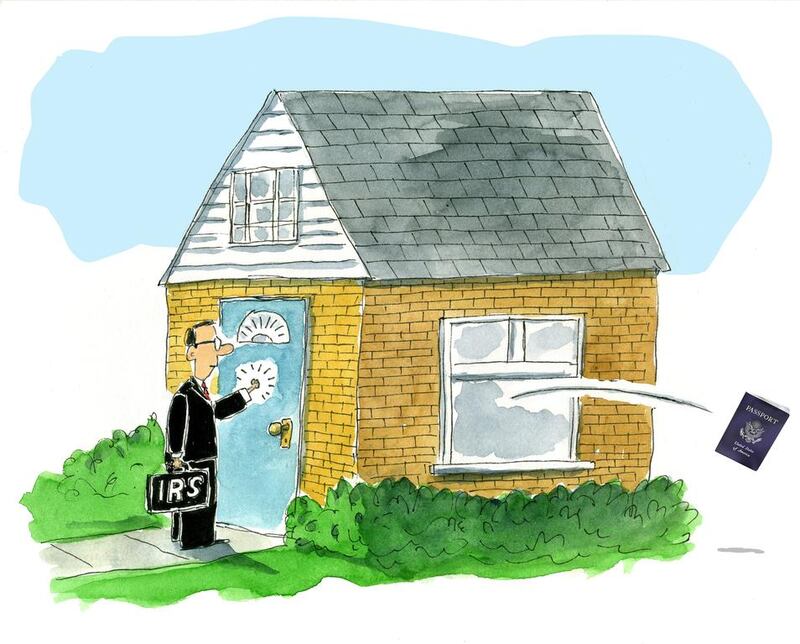Many people from this part of the world would jump at the chance of becoming American passport holders. But some people can't get rid of their green cards or associated travel documents fast enough.
My guess is that if we look into this, we'll find that the increasingly tough tax and compliance requirements being demanded by the American government is a big factor. And it affects all of us, whatever passport we hold. The latest figures from the US Federal Register indicate that more than 630 people relinquished their US citizenship during the final quarter of last year.
Granted this is a drop in the ocean when you think of the 6 million plus Americans believed to be living abroad – but I'm looking at trend and sentiment:
I believe that there is a simple linear correlation between tax deadlines and Americans giving up their passports.
In the third quarter of last year about 500 people chose to be expatriate. That followed a surge during the second quarter of 2013, when 1,131 people handed in their American passports. Contrast this with 189 people during the same period the year before.
Now let's look at tax deadlines: taxes were due on April 15 last year. That's the quarter in which there was a spike of more than 1,000 people giving up their American passports. That was also the deadline for applying for an extension, which would allow taxpayers up until October 15 to complete and file their paperwork – which is when we see another – albeit smaller – increase during the associated quarter.
Politics aside, what other reasons could be leading these people to give up, irrevocably, their "dream" of a passport?
In a word: FATCA. It stands for the Foreign Account Tax Compliance Act. This is the American government's attempt at recovering the estimated US$100 billion tax revenue lost to the treasury every year.
And what FATCA means is that every American citizen must declare their income to their government, regardless of where they live or earn, and that foreign financial institutions must report to the Internal Revenue Service about their American clients.
And we are all affected.
This is a mammoth undertaking for banks here: having to report directly to the IRS information about accounts held by US taxpayers, as well as about companies and entities in which US taxpayers are substantial shareholders.
This last point is something a friend of mine just found out; her husband is American and a majority shareholder in a company in the UAE. He declares his income from the company, but didn't realise that he needs to also inform the IRS that he is a shareholder, and as a result is breaking the law and risks being fined.
FATCA is changing the way banks do business and function. As a result, and in order to get their house in order, there are banks in the UAE that are happy not to grow their business at the moment, concentrating instead on this mega compliance with American dictate.
In fact, this cost of compliance is one of the many criticisms levied against FATCA. The argument goes that the cost of implementing this does not justify the hundreds of millions expected to be added to the treasury coffers as a result – it makes you realise just how much it costs to deal with this sort of red tape.
The United States is the only industrialised country that taxes nationals who live overseas, even if their income is generated outside of the US, and they never return to America. It is increasingly burdening its citizens with an ever more complex and costly tax regimen, with scant regard for whether other nation's laws would be broken if information required by the IRS is handed over.
I know of banks that are avoiding taking on clients with American passports or green cards, and who can blame them?
The good news is that all of this is creating opportunity for companies to come up with investment vehicles that Americans living abroad can buy into – they are being turned down by certain companies as a result of the compliance burden.
The bad news is that ignorance of the law doesn't hold up in court – so before you thank your lucky stars for whatever passport you have, make sure you're not considered an American citizen by the US … thousands of people are and don't know it. Having a great-grandparent, living or dead, born in the US is enough to deem you a citizen – and therefore liable for tax. It all reminds me of a response the United States secretary of defence Donald Rumsfeld gave during a US department of defence news briefing: "There are known knowns, and known unknowns."
Make sure your unknowns are known.
Nima Abu Wardeh is the founder of the personal finance website cashy.me. You can reach her at nima@cashy.me
Follow us on Twitter @TheNationalPF
Uncle Sam’s demands on tax go far and wide
Every American citizen must declare their income to their government, regardless of where they live or earn, and that foreign financial institutions must report to the Internal Revenue Service about their American clients.

More from the national




